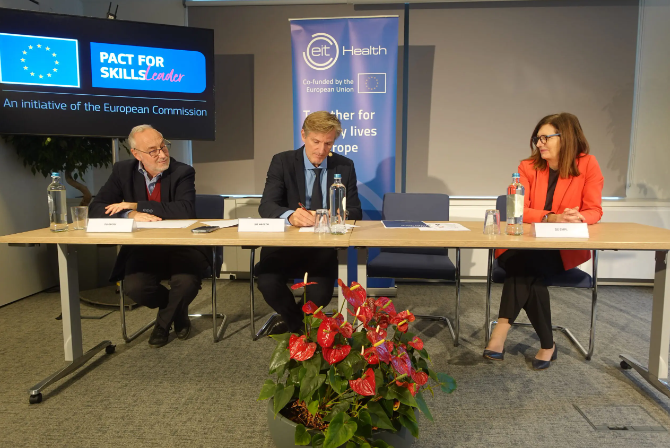New Industry-led Pact for Skills Partnership for the European Health and Life Sciences Sector Launched

EIT Health has been selected as the coordinator of the Skills Partnership for the European Health Industry, and in doing so, will collaborate closely with DG GROW and DG EMPL to bring about positive changes and boost skills development in the healthcare industry.
Following commitments in other industrial ecosystems, this Partnership is a concrete implementation of the Pact for Skills, one of the flagship initiatives under the European Skills Agenda for sustainable competitiveness, social fairness and resilience.
The Partnership’s aim is to work together to respond to the needs and challenges faced by the health industry and establish a shared model for skills development in Europe, pooling knowledge, experiences and resources. The overall goal is to attract new talent and support the existing workforce through reskilling and upskilling initiatives, promoting learning opportunities and ‘on-the-job’ training that strengthen the sector’s resilience and equip professionals with the skills they need.
Skills challenge facing the health industry
COVID 19 exposed the overwhelming need for a resilient and responsive healthcare system, and in response, the European Union’s industrial strategy upgraded healthcare to one of the key industrial ecosystems.
As one of the biggest and fastest growing industries globally, the healthcare sector is currently undergoing a rapid transformation fuelled by technological advancements, digital and green transition, economic changes, and societal shifts. These changes will enable innovation and high competitiveness of the EU in global markets and ensure the availability of medicines and devices for a good functioning and resilient healthcare system that is ready to respond in case of future public health threats.
Research by WorkInHealth Foundation shows the sector is also facing a major skills challenge as it prepares for the future. With nearly 8 million jobs affected by the skills shift, the challenges of making the health industry attractive to young talent, especially those with data skills, are enormous.
And with the number of chronic patients expected to increase by 67% by 2050 and an ageing population in Europe that will increase the need of health industry products, the need to address this skills shortage has become even more crucial.
To delve deeper into the objectives and initial actions of the Skills Partnership, follow the link:


 Share this page
Share this page


